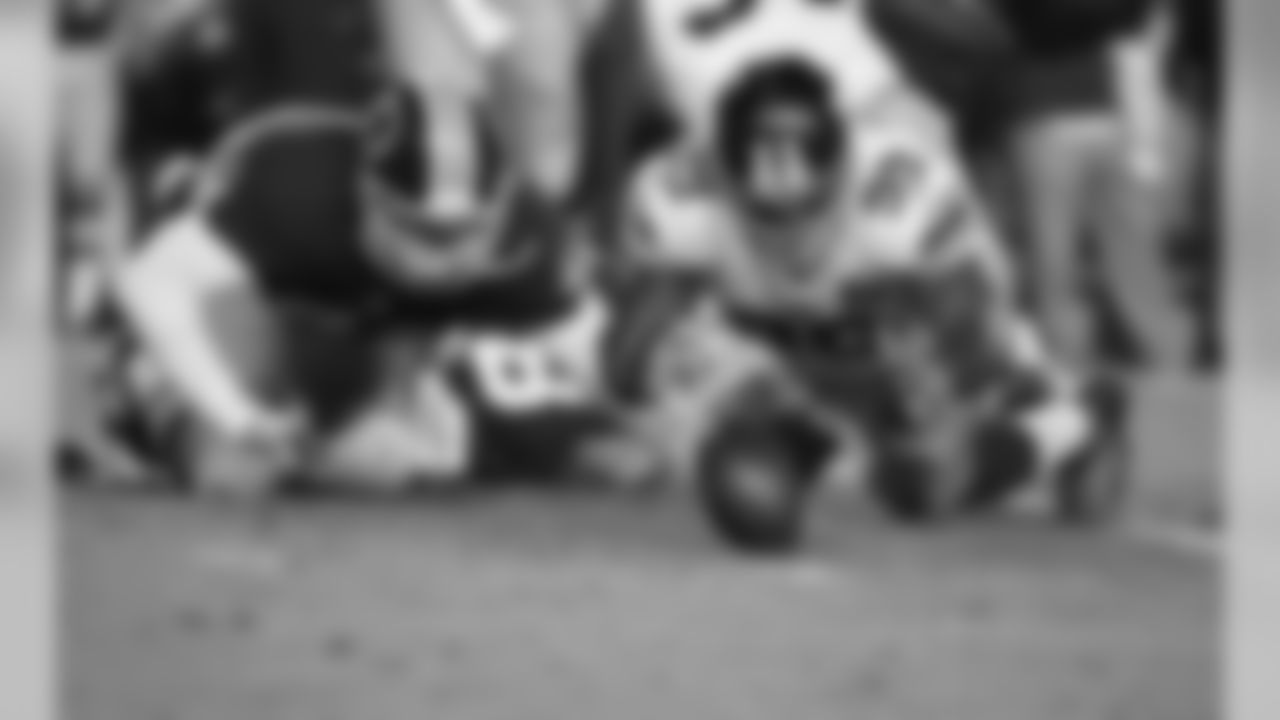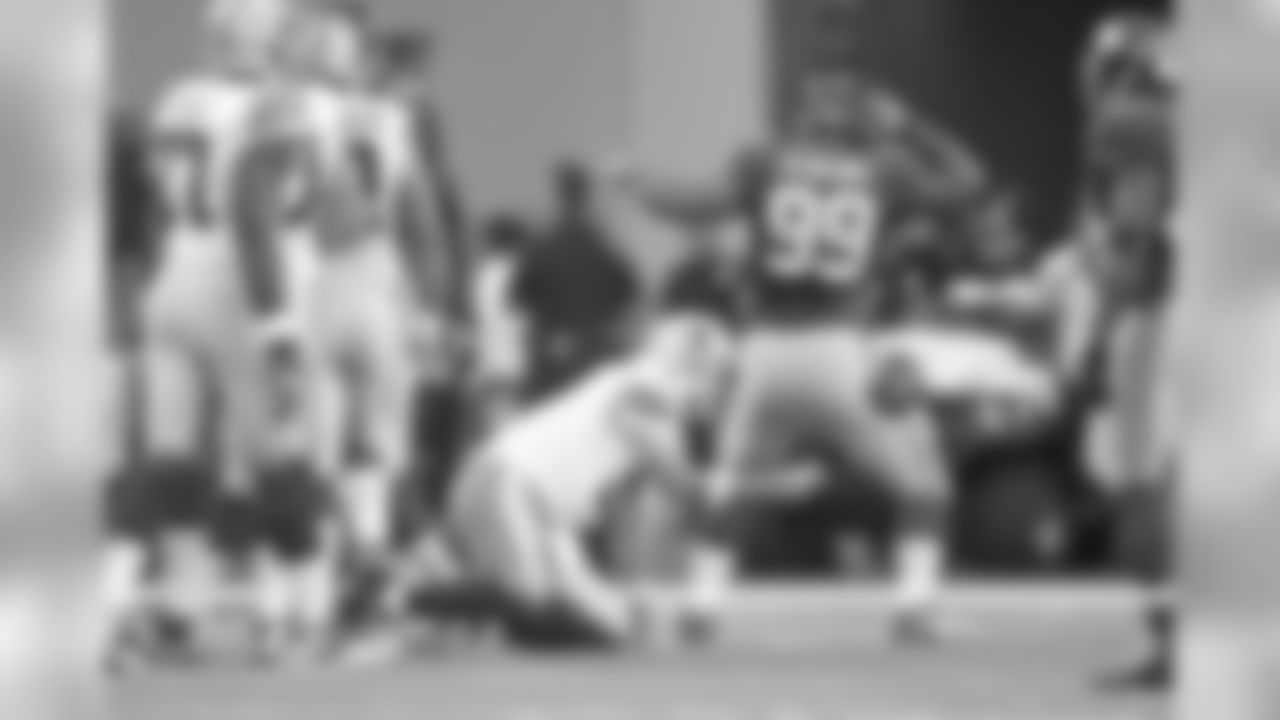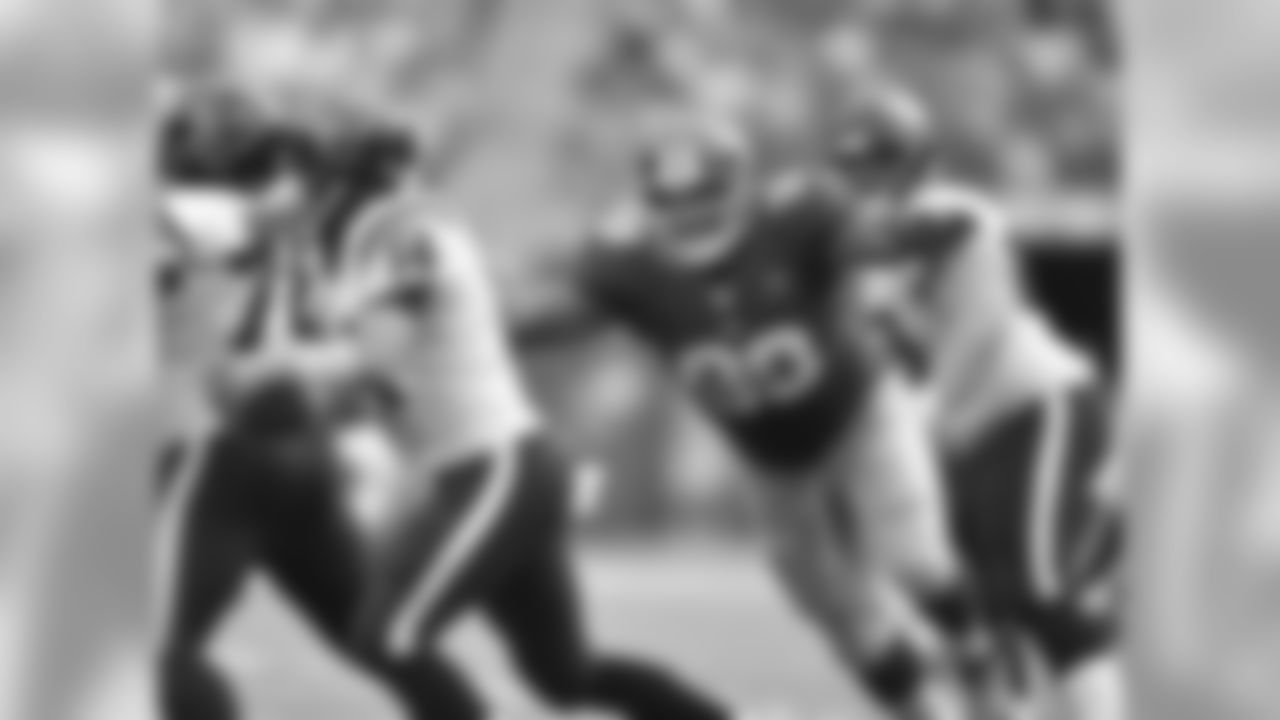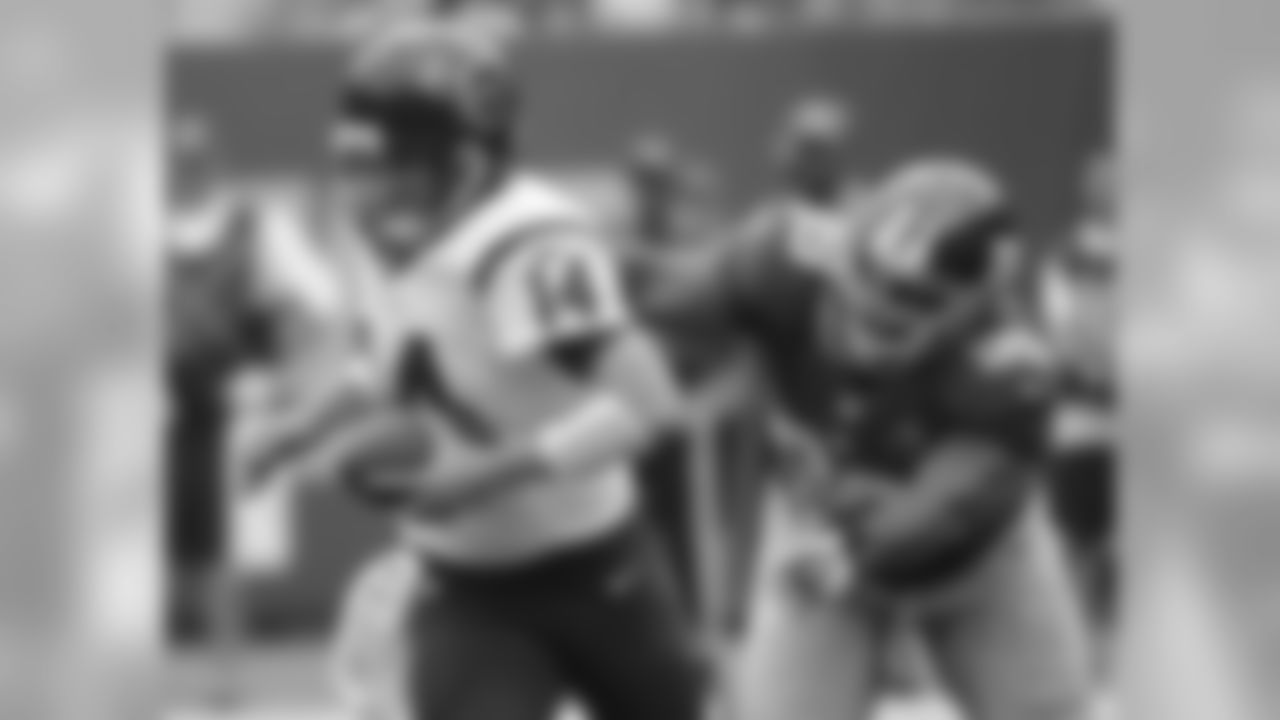**
Q: Where in Michigan did you grow up?**
Jenkins: "I grew up in Ypsilanti, Michigan. It's about 30 minutes outside of Detroit. I was raised by my dad. My parents were divorced. It was me, Kris and my dad in the household. Growing up all guys, it's pretty tough. My dad was tough on us, but he raised us the right way."
Q: Was your dad a teacher?
Jenkins: "He was a middle school teacher - a teacher and a coach."
Q: Am I correct in assuming that education was stressed in your house?
Jenkins: "Yes, it was, big time."
Q: Were you a good student?
Jenkins: "I had my share of troubles. I was a class clown a little bit so, I always would get in a little trouble here and there for things.
|
|
 |
|
|
Q: How much older is Kris than you?
Jenkins: A year and a half. We were pretty close growing up. He was always two grades ahead of me, but we were really close."
Q: Were sports a big part of your life when you were young?
Jenkins: "Oh yeah. My dad kept us in sports. Football, basketball and track so, we were pretty much year-round, one sport to the next. It was fun. Growing up, it's kind of how our lifestyle was. Everything revolved around sports."
Q: Did you have a favorite sport as a youngster?
Jenkins: "Basketball was probably my favorite growing up. I had a lot of fun playing basketball. Football started to catch on and as you got older you always hated training camps in football."
Q: Did Kris and you have usual brotherly wrestling matches and competitions?
Jenkins: "We competed in almost everything growing up. Competition was a big thing with us. We would go at it. Obviously, being that close in age you're going to have a lot of disagreements with your sibling. It was all in good fun. We're still close today."
Q: Were you always a defensive lineman?
Jenkins: "No, I didn't become a lineman until my sophomore year in college. I was actually a defensive back and running back in high school. Then my senior year in high school they moved me to linebacker, so I was a running back and linebacker my senior year. When I went to college I played as a true freshman at linebacker. In my freshman year at Central Michigan, we had four defensive ends that were seniors. When they left they needed defensive ends and they moved me down. That's how it started."
Q: How much did you weigh at the time?
Jenkins: "I was around 240, 245. It was a struggle at first."
Q: You also played basketball. No offense, but you don't look now like somebody who would run hurdles.
Jenkins: "I did the 110 hurdles, 300 hurdles. I even threw some discus."
Q: You must have been the most versatile guy on the track team.
Jenkins: "Yeah, I could do different things."
|
|
 |
|
|
Q: Were you thinner in high school?
Jenkins "My senior year I was about 215, 220."
Q: When did you think you might be able to play college football?
Jenkins: "I pretty much had the sense when I got to high school, watching my brother go through his recruiting process and getting ready, I knew I had a good chance of playing college football. The surprise for me was when I went to college I never thought I had a chance really to play in the NFL. When I first went to college, it wasn't until I saw my brother get drafted and go play and have the success he had that I felt like, 'Wow, that' something that I could probably do too.'"
Q: Why Central Michigan? Were you recruited by other schools?
Jenkins: "In the first game of my senior year of high school I had a high ankle sprain and I ended up missing most of the season. So a lot of the big schools that were recruiting me stopped. Central was the only Division 1 school that offered me a full scholarship.
Q: Were you disappointed you didn't get a chance to play at a Big Ten or other major conference school?
Jenkins: "I was disappointed at first, but I think it was a blessing in disguise. Because I always wonder if I would have gone to a bigger school they probably would have kept me at linebacker and I would have never made the move down to defensive line. So things happen for a reason."
Q: Did you play on good teams at Central?
Jenkins: "No, I think I won nine or 11 games in my whole college career. It was pretty rough."
Q: You must have excelled individually. Did you get a sense that at some point at Central that you were going to follow your brother into the NFL?
Jenkins: "It was tough. I had the thought later on, my junior and senior year, that I could possibly try and maybe do it. But my career in college, it wasn't a great career by any means. It was pretty average; I had pretty average numbers. I think that just going out at D-line, the learning process and picking up the technique and the skills and a lot of that stuff didn't come until I got to the NFL and I started to get around people and coaches that helped me to understand the things that I needed to do to compliment the strengths that I had."
Q: Is it safe to say you were not shocked when you didn't get drafted?
Jenkins. "I knew I would be an undrafted free agent, so it wasn't surprising to me."
Q: The Packers signed you as a rookie free agent and cut you at the end of training camp. What did you do that year?
Jenkins: "Landscaping."
Q: Did you think you would get another chance? Was it tough for you to be out of football after playing it your whole life?
Jenkins: Yes, it was tough. The toughest thing was, I was told when I got there or after I got cut that I had done enough to be on the practice squad and that they wanted to bring me back and put me on the practice squad. They thought that I could develop and it would be the best place for me. The day before, when it was time to sign and go to practice squad, they decided to go another route. Back then they only had five spots on the practice squad, so there wasn't a whole lot of room for people. That whole season, I never got a call for a workout, for anything from any team, so that was pretty discouraging. I felt like, 'Wow, nobody is interested in me.'"
|
|
 |
|
|
Q: Did the call you after that season?
Jenkins: "My agent had kept telling me, 'The Packers say they're going to bring you back at the end of the season.' You start to understand; you knew what it was, because they bring back people for bodies for training camp. I kind of understood what it was, they brought me back to send me to NFL Europe. When I went out there and played I think that was one of the best things for me in my career, because when I got out there at first I was just nervous about making the team (the Cologne Centurions). I thought, 'I can't come out to NFL Europe and not make the team. If I don't make the team here my football career will be over.' Not only did I make the team, but a lot of the coaches and scouts got a chance to see me and had real good things to say about me. Then the people I was playing with, a lot of my teammates, some of them had played on their teams for one, two, some even three seasons, so when people are telling you that you're playing better than people who have already made NFL teams it gave me a lot of confidence and hope that I can do it."
Q: When you got to the second training camp with the Packers you had that experience. Was that what was different, or did you tell yourself, "I'm not getting cut this time?"
Jenkins: "I had a totally different mindset. When I went there, especially coming off of the NFL Europe where I felt like I was starting to get attention from different teams, I thought, 'I'm just going to play my hardest. I don't care if Green Bay cuts me again I'm just going to play hard, make plays that way somebody will pick me up.'"
Q: Once you made the team your career took off. You played in all 16 games that season and four times in seven years in Green Bay. Am I stating the obvious to say the highlight of your time there was winning the Super Bowl?
Jenkins: "Winning the Super Bowl … it was a crazy experience, especially when we had to win the last two games of the season just to make it to the playoffs. From barely getting to the playoffs to going on a great run and winning the Super Bowl, that's something that you're going to have with you forever that can't be taken away."
Q: Did you ever walk out onto the field in Dallas that day and think, "Here I am, a free agent from Central Michigan and I'm playing in the Super Bowl?"
Jenkins: "I think the biggest thing that stood out to me that made me feel like, 'Wow, I made it,' was when we had the media day. When they do the media day they set up the booths on the field for different players (a team's most prominent players). Obviously, they can't do a booth for every player, so only certain players got to have booths. I walked out and saw I had a booth. I was like, 'Wow, here I am. I went from an undrafted free agent to being at the Super Bowl media day with my own booth.'"
Q: You also played in the 2007 NFC Championship Game against the Giants in 2007. What do you remember about that game?
Jenkins: "I remember how cold it was (minus-23 wind chill). I remember it was my birthday, January 20. It was my birthday, and all I wanted was to go to the Super Bowl that year. I remember it went to overtime and we won the coin toss and I was like, 'Man, we've got a great chance to go.' That faded away fast."
Q: You grew up in Michigan, but was that about as cold as you've ever been?
Jenkins: "Yes. That game there and there was one game we played in Chicago one year that was pretty cold."
Check out photos of DT Cullen Jenkins from the 2014 season










Q: After the Packers won the Super Bowl you moved to Philadelphia. Was it a mutual decision? As a free agent, did you think it was time to move on?
Jenkins: "You see the business part of it. Green Bay, they're known for building teams through the draft, developing young players. They had drafted young players at my position and they were trying to develop them and give them opportunities. It was what it was. You can kind of see that they were looking to move in a different direction and go that route. There are no hard feelings toward them."
Q: You started every game in your two seasons in Philly. Were those good years for you?
Jenkins: "You know, they were a learning experience. Every experience can't be the best experience. Sometimes you have to go through downs to appreciate the better years. Philly was definitely a little more stressful when I was out there.
Q: Your last year the team was 4-12 and Andy Reid was clearly in his last season as the Eagles' coach. It must have been a tough year.
Jenkins: "It wasn't fun at all. I don't like to lose, so going through that was tough. One of the big things for me was when I left Green Bay a lot was said about that I was injury prone or that I couldn't stay healthy. I didn't agree with that at all and I was pretty upset about the fact that people were saying that about me, because I feel like when you look at any player who plays tough in the trenches you're going to get beat up, you're going to go through some type of injury. Not only do I get beat up, but I fight through getting beat up. I know these last few years I've really been intent; I've played every game, stayed out on the field, fight through anything."
Q: Not every free agent from Central Michigan gets to play in the NFL for 11 years. Do you take a great amount of pride in what you've been able to do as an undrafted player from a school that's not exactly a football powerhouse?
Jenkins: "It's great. It's been a great run for me. I'd like to keep continuing it. I work hard to keep it going. I look back on it and I think one of the best things about it, my daughters being older now, they're in volleyball, basketball and they're actually taking up a little golf now. My oldest just made the high school volleyball team; she'll be a freshman this year. Just instilling in them the work ethic and the fact that you can accomplish your goals, you can accomplish your dreams with hard work. Even though you may feel like something may not be possible, if you work at it and continue to work at it you can make it happen."
Q: You married your high school sweetheart (Pashun), correct?
Jenkins: "Yes - I was 22, I want to say."
Q: How old are you daughters now?
Jenkins: "Jasmin is 14 and Ashanti is 11.
Q: Where is home when you're not here?
Jenkins: "Pretty much here is home. We go back to Michigan, but it's rare now. We have a house back there, but we barely get to see it anymore.
Q: You grew up in Michigan and went to college there. What are your thoughts about living in the metropolitan area?
Jenkins: "It's busy, really busy. I don't like traffic at all."
**
Q: You're in the wrong place.**
Jenkins: "It's a nice area, though. There are a lot of things to do. You get to introduce the kids to a lot of different things out here."
Q: What are your thoughts regarding what you will do when you're no longer playing football?
Jenkins: "You look at different possibilities, maybe coaching or helping out on a smaller level. I don't know if I would teach, but back when I was younger that was definitely what I wanted to do."
Q: Do you stress education with your girls as much as your dad did with you?
Jenkins: "Oh yes. I'm big on grades, big on education. I find myself doing more work with school now with them than I did when I was in school. It's been a learning experience for me too, helping with projects and staying on top of things, helping with homework. But yes, my wife and me are big on education."
Q: You've had a great career, you say you want to keep it going – do you see how you feel at the end of every season and decide if you want to continue playing?
Jenkins: "Year-by-year, day-by-day. You can't take anything for granted. I've been blessed and fortunate to be able to play as long as I have. The only way to continue to play is just to take it day-by-day."
Q: Are you still as competitive as you've always been?
Jenkins: "Definitely. I don't ever like to feel like I can't do something or I'm losing it. I take it as a challenge every time they bring in younger players. I help them along, but at the same time I compete, too. I never want to lose a step, I never want to fall off. I don't want to be looked at as a player who got content and just shut it down and collected paychecks. I'll fight to do well. I've got career goals that I would like to reach, team goals that I'd still like to get to as well. I continue to fight."





